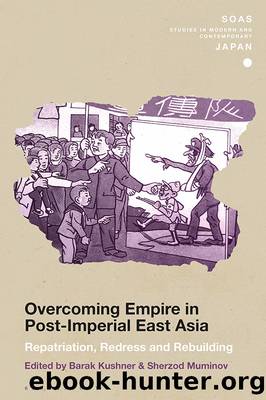Overcoming Empire in Post-Imperial East Asia by Barak Kushner;Sherzod Muminov;

Author:Barak Kushner;Sherzod Muminov;
Language: eng
Format: epub
Publisher: Bloomsbury UK
Chapter 6
ANTI-IMPERIALISM AS STRATEGY: MASKING THE EDGES OF FOREIGN ENTANGLEMENTS IN CIVIL WAR-ERA CHINA, 1945â1948
Matthew D. Johnson
The unraveling of Japanâs empire in China did not occur immediately, but in media terms its disappearance was swift. Reporting on the trials of people accused as traitors and collaborators was perhaps the most visible evidence of the shedding of imperial legacies.1 Military participants in the struggle against imperialism such as the Nationalist Party (KMT) of Chiang Kai-shek and Chinese Communist Party (CCP) of Mao Zedong also used anniversaries, first-hand accounts, and other forms of official and unofficial remembrance to portray themselves as authentic champions of the Chinese people and saviors of the nation.2 These public aides-mémoires also had international currency: they served to shame a reindustrializing Japan and to delegitimize domestic political rivals accused of having resisted or avoided participating in the national salvation effort.3 Nonetheless, the rapid forgetting of the war of resistance was an observable and widespread phenomenon even prior to the CCP victory over the KMT for control of the Chinese mainland in 1949.4
Yet disappointingly for many patriots in China, the empireâs unraveling did not bring an end to the longstanding situation of powerful external actorsâforemost among them the United States of America (USA) and the Union of Soviet Socialist Republics (Soviet Union)âinvolving themselves in Chinaâs insecure state of internal affairs. While Chinaâs war of resistance faded as a reality, it was quickly replaced by the KMTâCCP civil war, which had continued even during the years of total war against the Japanese Occupation. The dilemma was that Chiang, Mao, and others had to grapple with the reality of international alliances of necessity, at the same time making sure that they were not being perceived as mere tools of new imperialist forces. This chapter examines the strategies and rhetoric through which the USA and Soviet Union sought to play an influential role in the postwar landscape of a de-imperializing East Asia through political stagecraft, networks, and media. In revisiting propaganda in this way, my goal is to read statements about the impact of international forces on China not as ideology in the narrow sense of reflecting actorsâ systematic beliefs but as part of carefully constructed âmasksâ by which the CCP, KMT, USA, Soviet Union, and other lesser-known (and comparatively far weaker) political forces such as the Democratic League attempted to build up popular support through appeals to anti-imperialism, all the while pursuing supranational agendas of accommodation and coalition-building.
The chapterâs primary argument, which complements the findings of other work in this volume on the reconstruction of postwar East Asia, is that creating systems of postwar order and controlâin this case, control over public opinionânot only engaged many of the same powerful approaches and actors that had characterized the 1937 to 1945 wartime period but also necessitated engagement with new, quasi-imperial âedgesâ in the form of American and Soviet interests. The result of this contradictory state of affairs, which has remained relatively unexplored in the histories of the Chinese Civil War (1945â1949) to
Download
This site does not store any files on its server. We only index and link to content provided by other sites. Please contact the content providers to delete copyright contents if any and email us, we'll remove relevant links or contents immediately.
| Africa | Americas |
| Arctic & Antarctica | Asia |
| Australia & Oceania | Europe |
| Middle East | Russia |
| United States | World |
| Ancient Civilizations | Military |
| Historical Study & Educational Resources |
The Battle of Mogadishu by Matt Eversmann & Dan Schilling(698)
The Confidence Men by Margalit Fox(650)
The Spymaster of Baghdad by Margaret Coker(620)
A History of the Muslim World since 1260: The Making of a Global Community by Vernon O. Egger(616)
Jack the Ripper and the East End by Peter Ackroyd(584)
Empire of Fear: Inside the Islamic State by Andrew Hosken(565)
The Afghanistan File by Prince Turki AlFaisal Al Saud(551)
The Crimean War by Winfried Baumgart(545)
Akhenaten by Dominic Montserrat(535)
The Jerusalem Diamond by Noah Gordon(534)
Islam At The Gates: How Christendom Defeated the Ottoman Turks by Diane Moczar(531)
A Concise History of Greece (Cambridge Concise Histories) by Richard Clogg(527)
The History of Jihad by Robert Spencer(527)
Beirut 2020 by Charif Majdalani(514)
Israel: Ancient Kingdom or Late Invention? by Daniel I. Block(512)
Enemy in the East by Rolf-Dieter Müller(509)
The Privatization of Israeli Security by Shir Hever(500)
Destroying a Nation: The Civil War in Syria by Nikolaos van Dam(494)
The Nine Lives of Pakistan by Declan WALSH(491)
